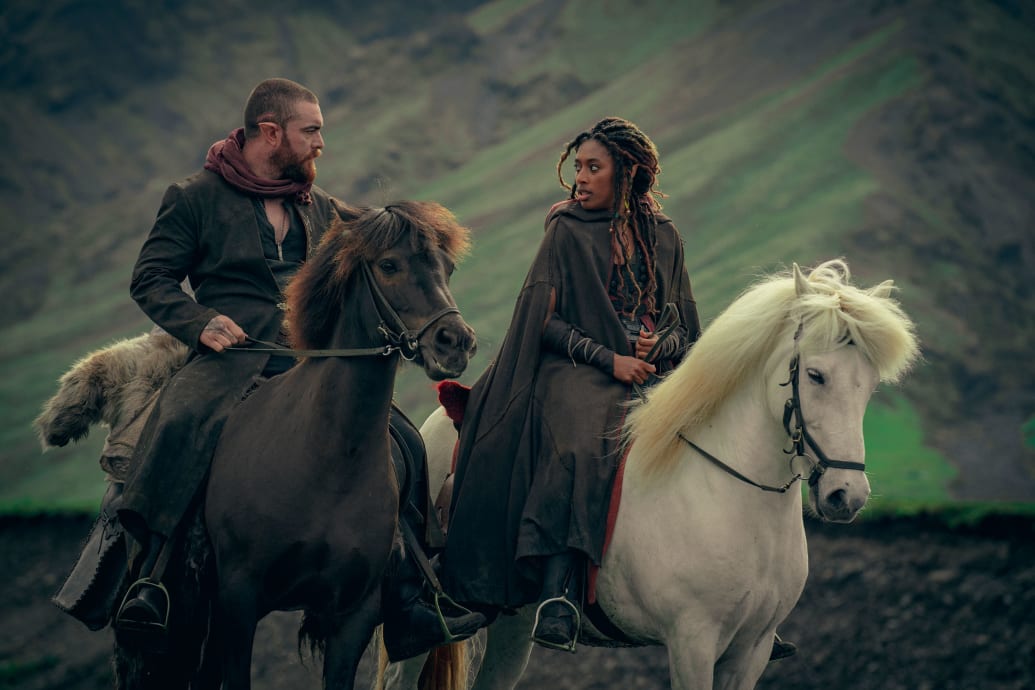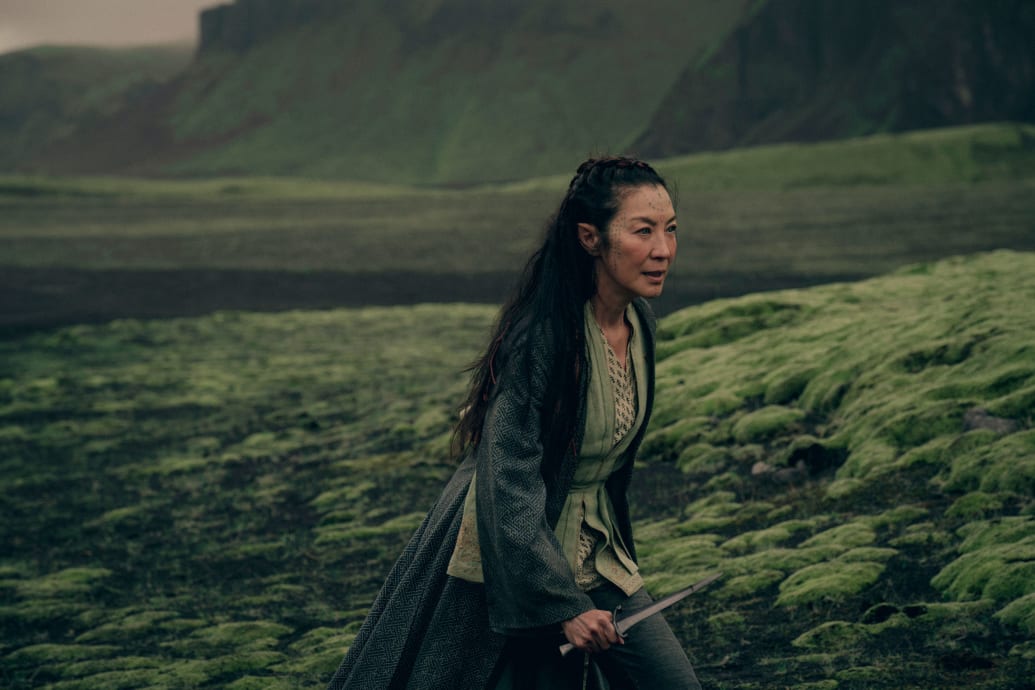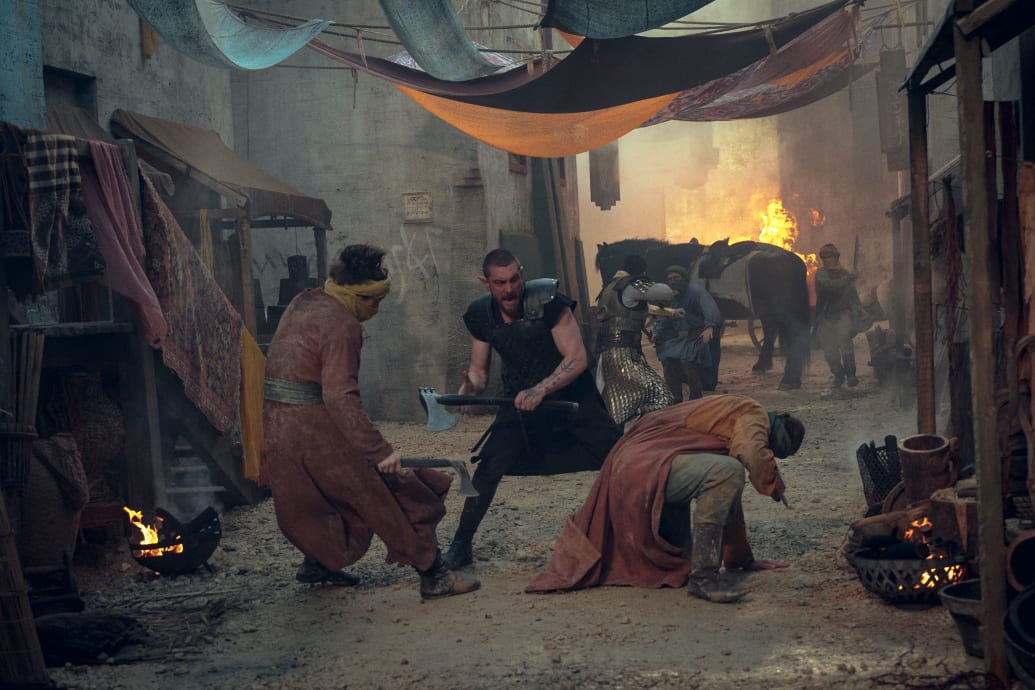The Witcher has become a sluggish chore that’s only propped up by the glowering charisma of Henry Cavill. Consequently, the leading man’s impending departure from the role of Geralt of Rivia (following 2023’s upcoming third season) doesn’t bode well for the series.
A lack of star magnetism is also a shortcoming of The Witcher: Blood Origin, a four-episode prequel that features no Cavill and only the sporadic appearance of Michelle Yeoh (hot on the heels of Everything Everywhere All at Once) in a ho-hum supporting part. Worse, though, is its consuming, crushing lack of imagination, its action indulging in fantasy clichés with almost belligerent zeal. Only completists need tune in.
So generic as to feel focus-tested, The Witcher: Blood Origin, which launches on Netflix on Dec. 25, is framed as an ancient legend recounted to bard Jaskier (Joey Batey) by some ill-defined shapeshifter played by Minnie Driver, who wants him to sing a vital old story back to life. There’s endless talk about songs and storytelling strewn throughout Declan de Barra and Lauren Schmidt Hissrich’s series, yet it’s just decorative babble intended to lend weight to what amounts to a rehash of every other swords-and-sorcery saga from the past half-century.
In any era, that familiarity would make it a slog. However, in a 2022 that’s already seen the premiere of House of the Dragon and The Lord of the Rings: The Rings of Power—two superior franchise-extending efforts—the show’s derivativeness falls somewhere between depressing and embarrassing.
Lark Season 1
Susie Allnutt
In the wake of its pointless introductory material, The Witcher: Blood Origin journeys back in time to recount “The Story of the Seven,” a long-ago yarn that concerns the birth of the first Witcher.
Though Yeoh is undeniably its biggest star, the series pivots around two blander personalities: Éile (Sophia Brown), a songstress known as the Lark who’s renowned for her popular Marxist tune and is a former member of her mother’s clan; and Fjall (Laurence O’Fuarain), a warrior from a rival clan who’s banished from the elven palace for sleeping with Princess Merwyn (Mirren Mack). When these two outcasts meet, they’re immediately at each other’s throats, since they’re on opposite sides of a Thousand-Year War being waged between the world’s three kingdoms.
On the eve of her sovereign brother striking a peace treaty that will end that conflict—by forcing her to marry a rival heir—Merwyn turns treacherous, partnering with army commander Eredin (Jacob Collins-Levy) and mage Balor (Lenny Henry) to slaughter all three kingdoms’ rulers as well as just about anyone else who might pose a threat to their subsequent reign. To do this, they use a flying dragon-ish beast that Balor has acquired from a scary alternate world where a disembodied voice has promised him untold “chaos magic” that he thinks will let him overcome his “lowborn” status.
That great power comes at a high price, but Balor is an evil wizard, so he’s more than happy to kill and betray—mainly by zapping people with fire—in order to get what he believes he deserves. Merwyn, meanwhile, wants to escape Balor’s control and use the mage’s multidimensional monolith portals to bring about a “golden age.”
All of this is standard-issue court-intrigue drama that’s been modeled after any number of Game of Thrones plotlines. No better, alas, is The Witcher: Blood Origin’s primary thread about Éile and Fjall, who bicker like foes but agree to join forces once they hear that Merwyn has staged a homicidal coup.

Lark Season 1
Lilja Jonsdottir
Together, they set out on a journey back to the elven kingdom, along the way picking up a variety of comrades who will fill out their team. Their initial stop brings them to Scian (Yeoh), a mystical Asian sword fighter who has a beef with the oppressive elves and who, unfortunately for Yeoh, has been imagined in clichéd one-dimensional terms. Still, the actress can at least take comfort in the fact that she’s not alone in that department, with every rebel collected by Éile and Fjall exhibiting only the faintest trace of personality.
Fearsome fighter Brother Death (Huw Novelli), celestial-twin mages Syndril (Zach Wyatt) and Zacaré (Lizzie Annis) and dwarf Meldof (Francesca Mills)—the last of whom incessantly talks to her hammer Gwen, named after her slain lover—round out Éile and Fjall’s posse, while the series also provides a covert gay love story for one of its peripheral figures and preaches working-class revolution at every available turn.

Lark Season 1
Lilja Jonsdottir
The Witcher: Blood Origin operates according to the hoariest of playbooks, refusing to do or say anything that hasn’t been seen in countless predecessors. It’s checklist television intended to comfort and congratulate rather than surprise or excite, and it’s far sloppier than it needs to be, racing through incidents at a speed that renders them superficial and inconsequential.
In a moment of inspiration that’s as random as it is bizarre, Syndril and Zacaré announce that the only way to defeat Balor’s titanic pet is to use an alternate-universe creature’s heart to beget an elf-monster hybrid—hence, the creation of a unique badass that will eventually lead to the world’s maiden Witcher. This will be fascinating intel for franchise die-hards and wholly underwhelming to everyone else, and the same goes for the predictable romance that develops between Éile and Fjall, two stock types whose amour won’t be reciprocated by most viewers.
Jokey banter, spooky rituals and duplicitous ruses fill out the narrative, as do a collection of violent skirmishes. It’s all perfunctory beyond belief, and undercut by the fact that the show’s generally impressive production design doesn’t extend to its climactic effects, which are almost shockingly mediocre.
Why Yeoh chose to lend her considerable talents to such a tossed-off venture—one that barely utilizes her over the course of its four installments, and offers her scant future franchise opportunities—is a question left unanswered by The Witcher: Blood Origin. It’s a deflating end to her standout year, and further proof that Netflix’s would-be fantasy goliath is just a pale imitation of its bigger, more established magic-and-might brothers. If the streaming service continues to have long-term designs for The Witcher, it would do well to more drastically differentiate it from its competitors—and, additionally, to convince Cavill to stick around.



